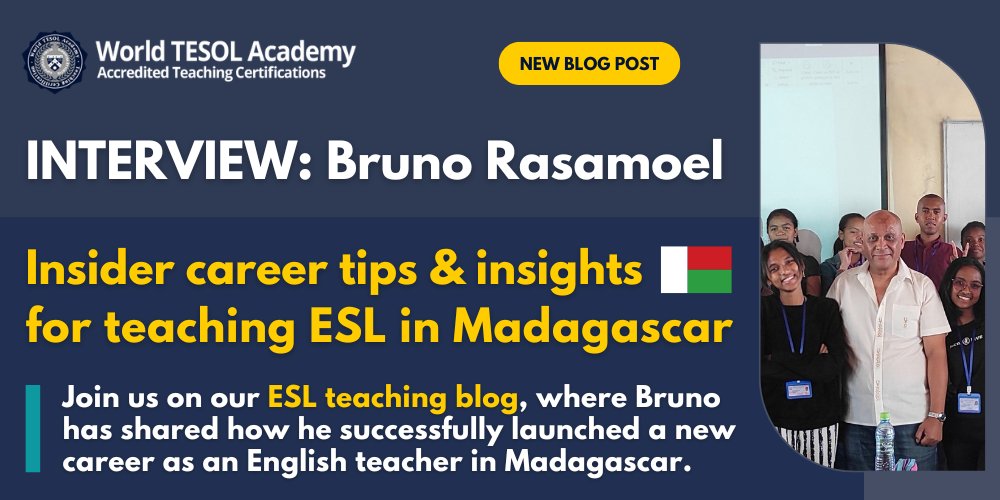
Graduate Interview: Bruno Teaching in Madagascar
In this article, we’ve had a chat with Bruno, a former translator and communications officer, who has shared his story and insights on how he successfully embarked on a new career path as an English teacher in Madagascar.
Exploring a new career path can be a transformative experience, offering fresh opportunities to grow both personally and professionally. While transitioning into a different field often comes with challenges, it also brings the chance to discover new passions and skills.
Bruno made the leap from translation and communications to teaching English in Madagascar, embracing the challenges and rewards of starting a new chapter in his career.
Let’s explore how Bruno made this possible and hear his best tips on how you too can explore a new career!
About Bruno
Bruno is a former translator and communications officer with the USAID who decided to explore a new career path as an ESL teacher. With a passion for communication and education, he now teaches General and Business English to college students in Madagascar.
Name: Bruno Rasamoel
Nationality: Malagasy (Madagascar)
Profession: English language teacher
Experience: 2.5 years
Looking ahead, Bruno plans to further refine his teaching skills by participating in training and workshops, with the goal of contributing to teacher development initiatives and enhancing the quality of education in Madagascar.
Bruno’s interview:
💬 How long have you been teaching English?
“I have been teaching English for two and a half years. My journey began with a three-month probationary period, after which I was officially confirmed as a regular teacher in November 2022.
I taught Business English to the staff of a couple of private companies while simultaneously working at the college where I am currently employed.”
💬 What made you decide to pursue an English teaching career?
“My education was deeply influenced by my formative years at Saint-Michel, a Jesuit-run Catholic school in Madagascar, where I completed nearly all of my primary and secondary schooling.
After retiring from a fulfilling career with USAID, I wanted to give back to the institution that shaped me. I have always been passionate about English, thanks to the exceptional teachers I had at Saint-Michel, and I wanted to help keep that tradition of excellence.
When I knew that the Information and Communication College (SAMIS-ESIC) based at Saint-Michel was seeking an English teacher, I felt like it was THE perfect opportunity. Combining my love for the language and my gratitude toward my alma mater, I eagerly embraced the role and have found great pleasure and fulfillment in teaching ever since.”
💬 Where do you currently teach, and how did you find this teaching position?
“I currently teach at the “École Supérieure de l’Information et de la Communication” (SAMIS-ESIC), a communications college established by Saint-Michel in 2001.
I discovered this teaching opportunity through networking. My nephew, who graduated from SAMIS-ESIC in 2021, informed me that the college was seeking a replacement for their English teacher, who was about to leave.
Although I was still a few months away from officially retiring from USAID, I decided to apply for the position. The timing was a happy coincidence, and I was delighted to transition into this role shortly after my retirement.”
💬 What does your role as a teacher at SAMIS-ESIC involve?
“My role involves teaching general and business English to first- and second-year students, aged 17–20, who are non-native English speakers, and have a basic foundation in English from high school. However, their proficiency levels vary significantly.
For first-year students, the first semester focuses on building a strong foundation in general English. This includes improving pronunciation, expanding vocabulary, and mastering essential grammar concepts. Key areas of grammar covered include verb tenses, conditional clauses, nouns and pronouns, modal verbs, subject-verb agreement, idiomatic expressions, and preposition usage. I also place significant emphasis on developing writing skills—focusing on clarity, conciseness, and consistency—and enhancing listening comprehension abilities.
In the second semester, the focus shifts to improving students’ speaking skills. This is achieved through activities like reporting on readings, engaging in discussions, and participating in debates on simple, relevant topics.
For second-year students, English is taught only during the first semester during which I introduce the fundamentals of business English, equipping them with the skills necessary for professional communication. This includes teaching them techniques for drafting press releases, speeches, news reports, and slide-aided presentations.
My approach emphasizes building their confidence and fluency, enabling them to effectively apply their theoretical knowledge in practical scenarios.”
💬 What kind of teaching qualifications do you possess?
“I took a TESOL training course in March 2022, which provided a comprehensive overview of teaching English to non-native speakers in both overseas and online classroom settings.
Following this training, I was awarded a TESOL/TEFL Certificate by the World TESOL Academy in June 2022. This certification equipped me with a solid ground in teaching methodologies, language skills, and classroom management, all of which have been integral to my teaching journey.”
💬 How did earning your 120-hour TESOL/TEFL certificate support your career change and help you transition into teaching?
“Before earning my TESOL/TEFL certificate, I had limited teaching experience to say the least. My daughter, who was commercial manager in a local IT firm, identified the 120-hour TESOL Certificate course and recommended it to me, which I was fortunate to enroll in at a discounted rate.
The course turned out to be a pivotal step in my career change, providing me with essential teaching tools and techniques. The training covered a wide range of topics, including grammar (such as punctuation, sentence structures, and tenses), language skills (reading, writing, speaking, listening, and pronunciation), lesson planning, and teaching methodologies.
As a novice teacher, the sections on lesson planning and classroom management were especially useful. They taught me how to design effective lessons, maintain a productive and respectful classroom environment, and motivate students to engage and learn.
The TESOL course not only enriched my knowledge of English language instruction but also gave me the confidence and skills to step into the classroom and adapt quickly to my new role. It went a long way in laying the foundation for my teaching practice and continues to influence my approach to education.”
💬 Would you recommend aspiring teachers to pursue English teaching certifications like TESOL/TEFL?
“Absolutely. I would not only recommend TESOL/TEFL certifications to aspiring teachers but also consider them essential prerequisites for success in the field.
These certifications provide the basic knowledge and practical skills necessary to teach effectively, whether in classroom or online environments (although I have not yet started online teaching).
They help new teachers develop confidence, master teaching methodologies, and address the diverse needs of students.”
💬 How did your previous roles prepare you for a teaching career, and were there any skills that transferred surprisingly well?
“My previous roles provided me with several skills that have been invaluable in teaching. As a translator, I developed a natural ability to clarify complex concepts and explain challenging vocabulary in simple terms—a skill that is directly relevant to teaching non-native speakers.
As a communications officer, I gained experience addressing large audiences confidently, which helped me overcome nervousness or shyness when speaking in front of a classroom.
Additionally, my background in communications taught me to adapt messages for different audiences, a skill that translates well into making lessons understandable and accessible to students with varying language abilities.
These experiences laid a strong foundation for my teaching career and enabled a smooth transition into the classroom.“
💬 Were there any skills you didn’t think would be useful for teaching but turned out to be valuable?
“One surprising skill was the ability to manage emotions effectively, which I acquired during an anger management training course I attended while working at USAID. Initially, I did not think this training would be relevant to teaching, but it has proven incredibly valuable.
Teaching requires patience, especially when students struggle to grasp concepts or when they lose attention, affecting the classroom dynamics.
The TESOL course also emphasized strategies for managing problem students. These skills have helped me create a supportive learning environment and respond to challenges with understanding and empathy.
Based on feedback from the college board, these qualities have been highly appreciated by my students and have contributed significantly to my effectiveness as a teacher.“
💬 Did you face any challenges when transitioning into teaching, and if so, how did you overcome them?
“I would not say I faced major challenges, but there was an initial fear of not performing well or meeting the expectations of my students and the institution. This anxiety arose from the fact that teaching was a new field for me, and I was not entirely sure how my skills and knowledge would fit in the classroom environment.
To address this, I relied heavily on the principles and methodologies I learned during my TESOL/TEFL certification. Carefully planning my lessons with the help of AI, focusing on clear objectives and interactive activities, I managed to engage students and make learning enjoyable. These strategies allowed me to transition smoothly into teaching, transforming my initial fear into motivation to perform better.“
Want to start your teaching career? Get TESOL/TEFL certified:
To teach English overseas and online you’ll need to have an accredited and recognized TESOL/TEFL certificate.
With World TESOL Academy’s accredited 120-hour TESOL/TEFL course you’ll develop the necessary skills needed to launch your teaching career.
Or click here to get a free preview of the course.
.
💬 Can you describe a typical work day as an ESL teacher in Madagascar?
“As an ESL teacher in Madagascar, my teaching schedule involves classes twice a week: first-year students on Mondays and second-year students on Wednesdays. While this may seem light compared to a daily teaching routine, my Sundays are particularly busy as I dedicate the entire day to lesson planning and preparation.
This involves designing activities tailored to the language proficiency levels of my students, ensuring the lessons are engaging and meet their learning objectives.
I teach very large classes, each with around 120 students divided into two groups of 60. Managing such large groups requires careful planning and innovative teaching strategies to maintain student engagement and ensure everyone participates actively. My focus is on creating an interactive learning environment where students can practice their reading, writing, speaking, and listening skills effectively.
My responsibilities are primarily centered on teaching and lesson preparation, as I do not handle administrative tasks. During class, I use a mix of lectures, discussions, group work, and individual exercises to cater to diverse learning styles.“
💬 How does teaching General and Business English differ in terms of teaching approach, planning, materials, and student needs?
“I think teaching general English is much more time consuming because it focuses on everyday communication and improving overall language proficiency. The approach I use here covers a range of topics such as grammar, vocabulary, reading, writing, speaking, and listening. I try to make the activities as interactive as possible, including role-plays/dialogues, storytelling, or group discussions to build fluency and confidence in daily interactions.
In teaching business English, my approach emphasizes professional communication skills such as writing news reports, press releases, speeches, giving presentations, interview simulations, and open discussions. Lessons often simulate workplace scenarios to prepare students for real-world contexts.
When planning General English lessons, I focus on various topics that address my students’ diverse interests, and I design activities that aim to enhance both language skills and cultural awareness. Again, the language I use here is understandable and accessible to all students to accommodate their varying interests and proficiency levels.
Planning for Business English requires adapting the lessons to specific trades or professions, often based on the students’ career aspirations. My college does not prescribe specific materials for teaching either general English or business English, giving me the flexibility to select resources that I think best suit my students’ needs.
I primarily rely on virtual resources available online, such as VOA Learning English, Breaking News English, the U.S. Department of State’s “American English, and similar platforms.“
💬 Are there any specific teaching methods or strategies you’ve found particularly effective when teaching?
“I’ve found that encouraging students to take initiative is one of the most effective teaching strategies. Since I teach very large classes, I’ve adopted a system of breaking students into smaller teams rather than groups.
Referring to them as “teams” fosters a sense of camaraderie and healthy competition. This approach helps me better supervise and engage with each team while motivating the students to excel.
For example, I frequently organize team-based activities such as speech contests, where I reward the winning teams with bonus points—two points for first place and one for second. This not only inspires students to put in their best effort but also makes learning enjoyable and dynamic.
One memorable instance was a speech contest I organized for my second-year students. Teams worked collaboratively to prepare and deliver speeches, with the winning teams earning well-deserved bonuses. The activity sparked creativity, teamwork, and a competitive spirit, making it a highlight of my teaching approach.“
💬 What has been the most rewarding part of your teaching journey so far?
“The most rewarding part of my teaching journey has been the overwhelmingly positive feedback I’ve received from both college students and business professionals.
For instance, while teaching business English to staff at Shell, my initial three-month contract extended to a full year due to the students’ enthusiasm and their requests to continue the program. Knowing that my teaching had a meaningful impact on their professional growth was immensely gratifying.
Teaching has also broadened my own perspective and enriched my personal growth. It’s incredibly fulfilling to witness students’ progress and to know that my efforts have helped them achieve their goals. Whether it’s enabling someone to secure a promotion or helping a shy student gain confidence, these experiences reaffirm my passion for teaching.“
💬 Do you have any success stories or memorable experiences with students that reminded you why you chose to become a teacher?
“I have a few success stories that remind me of the deep impact a teacher can have on a student’s life. One particularly touching experience was with a lower-intermediate student from Shell. He struggled significantly with English and felt self-conscious about speaking in front of others. He confided in me about his difficulties, and I reassured him that these challenges could be overcome with consistent practice and patience.
To help him, I created a “safe space” in the classroom where he could express himself without fear of immediate correction. Instead, I provided constructive feedback after he finished speaking, addressing the entire class to avoid singling him out. This approach helped him build confidence gradually.
By the end of the course, he had made remarkable progress and even ranked first in the final assessment. His success was celebrated as a milestone within Shell, and it remains a moment of pride for me.
Another success story involved a high-intermediate student who aspired to work at Shell’s central headquarters in Europe. Although his English skills were already strong, we focused on intensive speaking practice for six months.
His hard work paid off when he secured a position elsewhere, which I suppose is at the headquarters. Though I didn’t have the chance to congratulate him in person, knowing I played a role in his professional achievement continues to inspire me.“
💬 What is the ESL teaching market like in Madagascar?
“The ESL teaching market in Madagascar presents significant potential, with a growing recognition of the importance of English in education, business, and global opportunities. Malagasy youth, in particular, are enthusiastic about learning English as they see it as a portal to better career prospects, international collaboration, and access to global knowledge.
The demand for English education is increasing, especially in urban areas where industries like tourism, trade, and foreign investment are growing. English is also increasingly recognized as a valuable skill for students pursuing higher education abroad or seeking roles in international organizations.
Consequently, English proficiency can open doors for students to secure better-paying jobs and participate in global initiatives, which has created a strong incentive for learning the language. Despite this demand, the ESL teaching market faces some challenges.
One of the most pressing issues is the need for better teacher training. Many English teachers in Madagascar lack advanced proficiency and fluency, which hinders the quality of instruction. I think that investment in teacher development programs, workshops, and access to modern teaching methodologies would greatly enhance the overall standard of English education in the country.
Teaching opportunities for ESL instructors are expanding. They range from secondary schools to universities, language institutes, and corporate training programs. Private tutoring and online teaching platforms are becoming increasingly popular, providing flexible options for teachers to reach a wider audience.“
💬 Do you have any tips for teachers who are interested in teaching in Madagascar?
“For teachers interested in teaching in Madagascar, networking is key— Aspiring teachers may like to connect with local schools, language institutes, and organizations like the Madagascar English Language Teachers Association (Madagascar ELTA) which I’m a member of.
They may also like to research opportunities online through LinkedIn or Facebook which is a very popular platform in Madagascar, or through international programs.
Familiarizing with Malagasy culture is also important, which values respect, politeness, and community, and highly facilitates communication with students. Flexibility and a willingness to learn about local customs is helpful for a smooth integration.
For applications, you may highlight your experience in teaching non-native speakers and your ability to adapt to diverse settings. During interviews, it would be useful and appropriate to show enthusiasm for contributing to students’ growth and an understanding of Madagascar’s educational context.
For more on this, it might be necessary to touch base with the Ecole Normale Supérieure (ENS or the Teacher Training College).“
💬 What advice would you give to someone considering a career change into teaching but feeling hesitant to take the leap?
“As a novice teacher, I recognize that I am still learning and may not yet fully grasp all the requirements of the role. However, I feel that if one considers a career change into teaching, they should start by identifying their passion for helping others learn—it’s actually the basis of a fulfilling teaching career.
We may begin with small steps, like volunteering or tutoring, to gain experience and confidence. We also need to pursue relevant qualifications, such as a teaching certificate or ESL training like TESOL. Most employers value patience, adaptability, communication skills, and enthusiasm for the subject we teach, and we should focus on these aspects in our resume and interviews.
My recommendation is “it’s never too late to start” and I’m a living example of that. Teaching offers the chance to make a meaningful difference in others’ lives and grow personally.“
💬 What’s next in store for you? In which direction do you see your teaching career heading?
“Honestly, I have not thought about that in detail yet. Having just started teaching, my immediate goal is to improve my techniques through training and participation in seminars organized from time to time by Madagascar ELTA.
In the future, I hope to contribute to teacher development initiatives and, why not, mentor novice teachers, sharing what I’ve learned along the way.“
Conclusion
For those considering exploring a new career path, ESL teaching offers the opportunity to make a meaningful difference in the lives of the next generation, while also opening doors to personal growth and professional fulfillment.
Bruno’s journey shows that transitioning into a new career can be both rewarding and achievable with the right mindset and dedication. His experience highlights the importance of leveraging transferrable skills and strengths while also pursuing relevant training and certification.
If you’re ready to pursue a new career as an English teacher, now is the perfect time to take the first step and start your TESOL/TEFL teacher training.


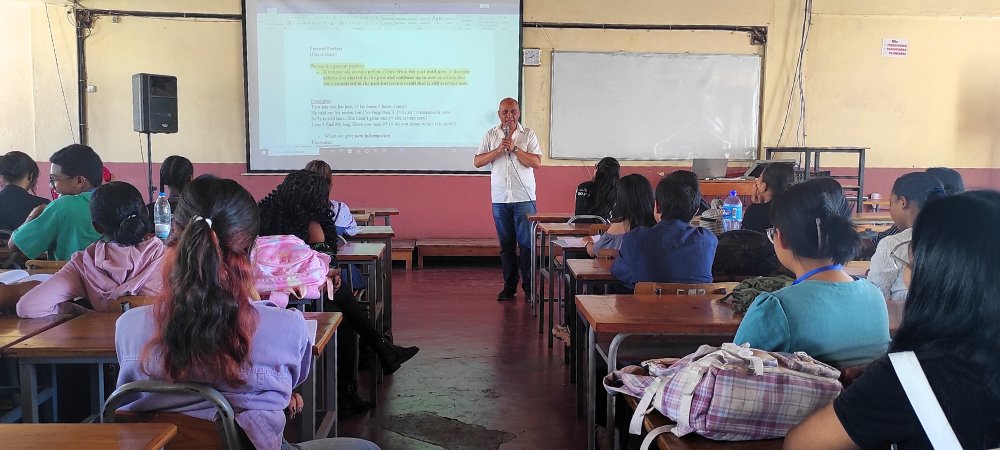

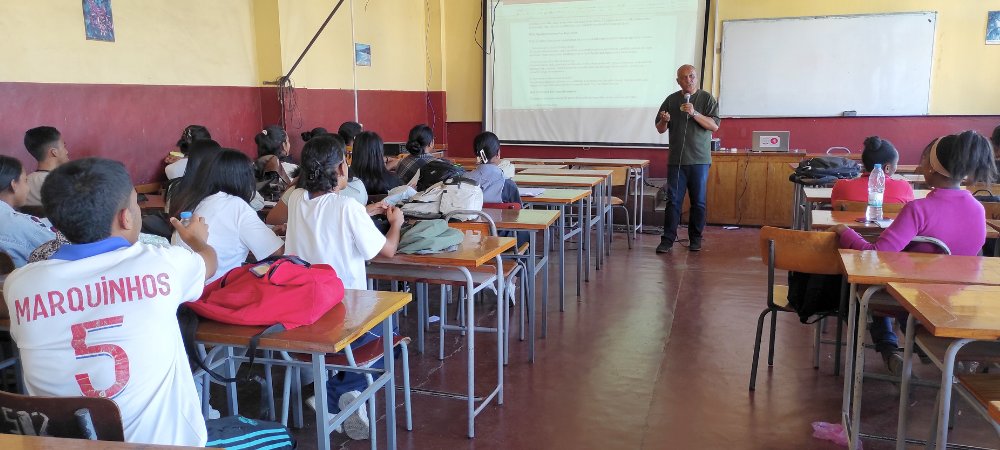
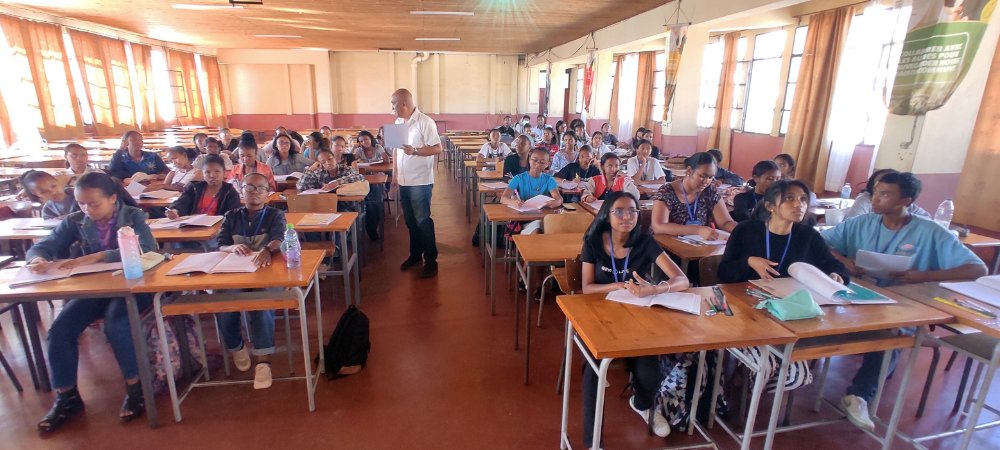
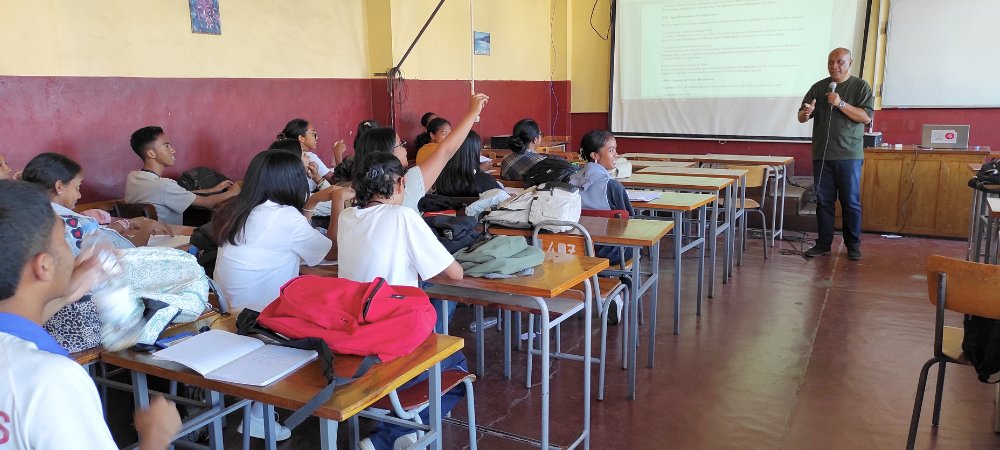

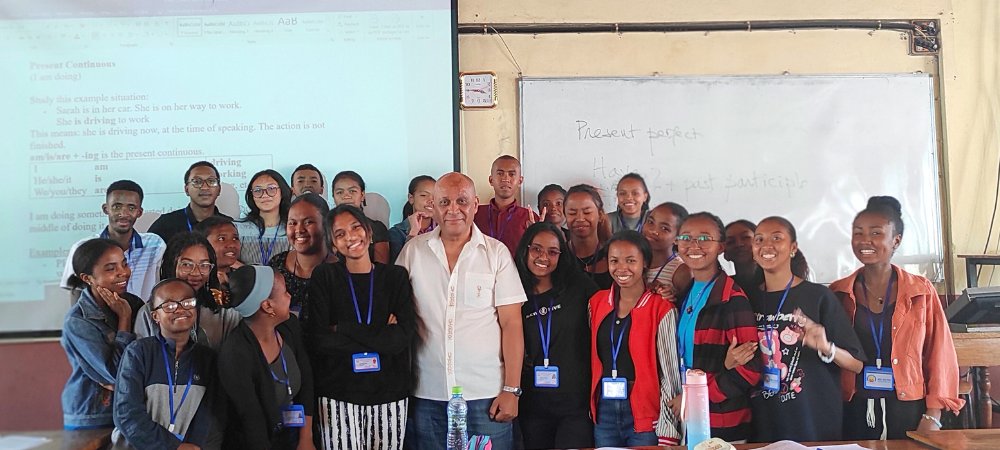
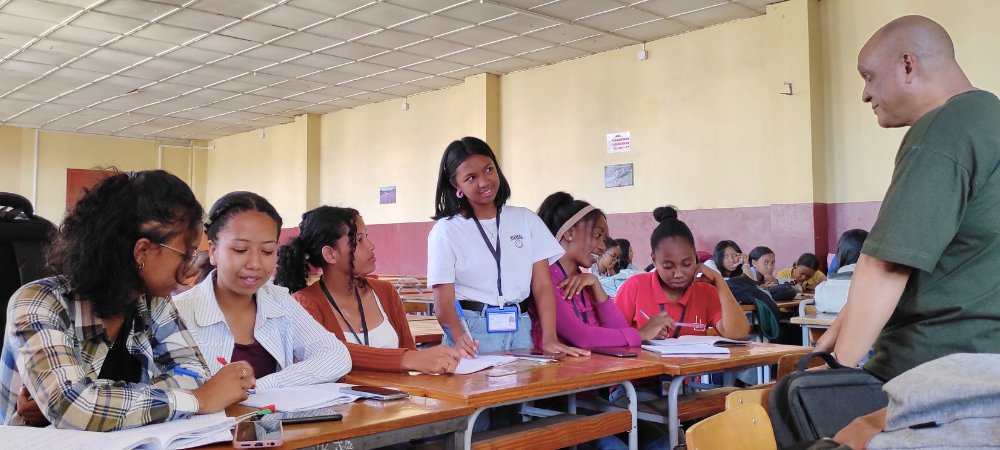



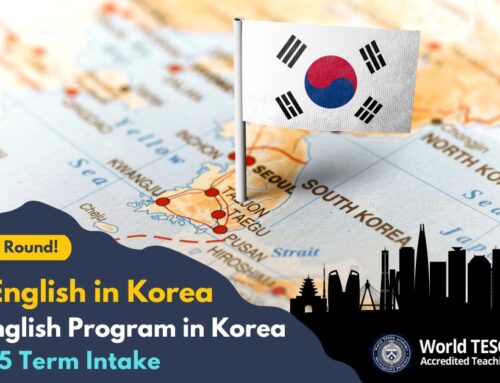

Leave A Comment